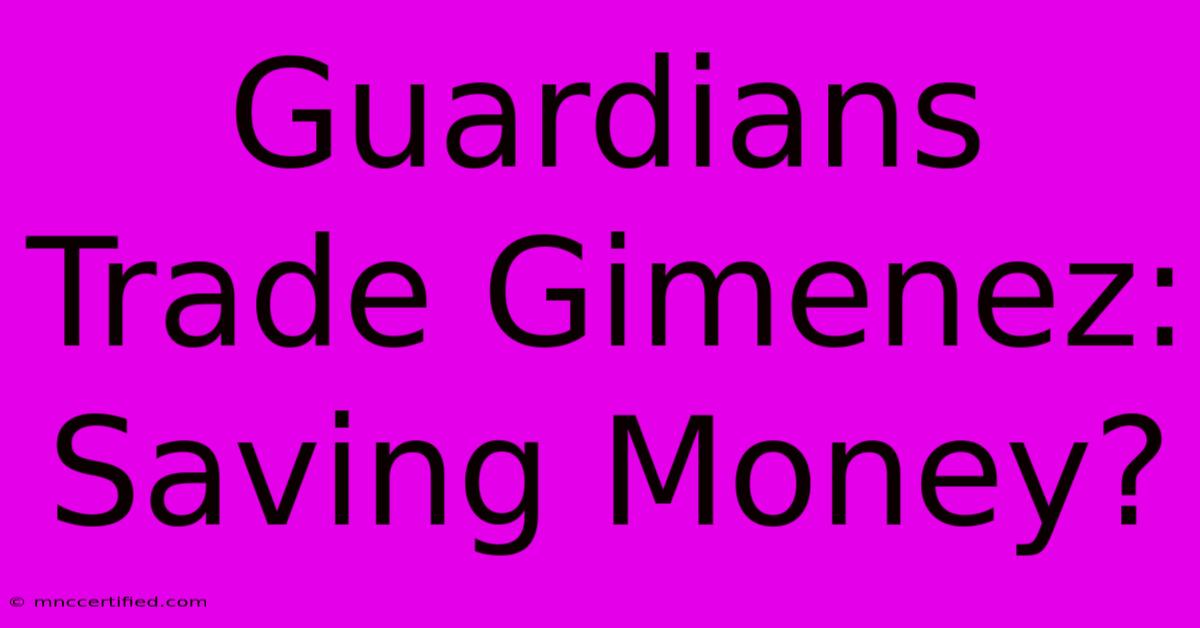Guardians Trade Gimenez: Saving Money?

Table of Contents
Guardians Trade Gimenez: Saving Money? A Deeper Dive into the Deal
The Cleveland Guardians' trade of José Ramírez's younger brother, Amed Rosario, and young pitching prospect Noah Syndergaard to the Los Angeles Dodgers for infielder Josh Bell and cash considerations has sent ripples through baseball circles. While the immediate reaction focused on the loss of Rosario and Syndergaard, a key underlying factor is the potential for significant salary savings for the Guardians. This article delves into the financial implications of the trade and analyzes whether it truly represents a cost-cutting measure for the team.
The Financial Picture: More Than Just the Roster
The surface-level analysis might focus on the Guardians shedding salary by trading Rosario, a player who was eligible for arbitration. However, the picture is far more nuanced. Simply looking at the immediate impact of removing Rosario's salary from the books overlooks several crucial factors:
Bell's Contract and Potential Savings
Josh Bell, acquired in the trade, is entering the final year of his contract. His salary is significantly lower than Rosario's projected arbitration salary. This difference represents a clear short-term financial gain for the Guardians. But the cost savings aren't solely about Bell's lower salary; it's also about the potential for future flexibility.
Future Budgetary Implications
By lowering their payroll in 2024, the Guardians have opened up more financial flexibility. This could be crucial for future player acquisitions, contract extensions with key players, or even improving their minor league system. In essence, this trade isn't just about short-term cost-cutting; it's a strategic maneuver to optimize their financial resources for long-term success.
The Hidden Costs of Prospect Development
Trading away prospects like Noah Syndergaard represents an opportunity cost. The Guardians are foregoing the potential return on investment in Syndergaard's development. If he had reached his full potential, his value could have far exceeded the short-term savings gained from this trade. This underscores the complexity of evaluating trades based purely on immediate financial impact.
Beyond the Dollars: Strategic Considerations
The Guardians’ decision isn't solely driven by financial constraints. The team's front office is renowned for its analytical approach, emphasizing long-term strategic planning over immediate gratification. This trade reflects that philosophy.
A Shift in Team Strategy?
The trade might signal a shift in the Guardians' strategic direction. By focusing on cost-effectiveness and acquiring players with shorter-term contracts, the Guardians may be prioritizing flexibility and future competitiveness. This approach contrasts with some teams that prioritize high-spending strategies.
The Impact on Team Performance
The short-term impact on the team's on-field performance remains uncertain. Bell is a proven hitter, but his defensive skills aren't as strong as Rosario's. This trade may lead to a change in team dynamics and potentially impact the overall team performance. Careful analysis of the team's roster and potential replacement strategies will be crucial.
Conclusion: A Calculated Risk
The Guardians’ trade for Josh Bell is more than just a simple cost-cutting measure. It represents a calculated risk, prioritizing long-term financial flexibility and strategic roster management. While the immediate financial benefit is apparent, the long-term impact on team performance and future success remains to be seen. The success of this strategy will depend heavily on the Guardians' ability to effectively use their newly acquired financial flexibility and the performance of their remaining players. Only time will tell if this move truly pays off for the Cleveland Guardians.

Thank you for visiting our website wich cover about Guardians Trade Gimenez: Saving Money?. We hope the information provided has been useful to you. Feel free to contact us if you have any questions or need further assistance. See you next time and dont miss to bookmark.
Featured Posts
-
Sex Education Actor Faces Sex Crime Charges
Dec 12, 2024
-
Carrey On Sonic 3 London Premiere
Dec 12, 2024
-
Property Signature Uk Affordability
Dec 12, 2024
-
Free Musical Night Ao Arena
Dec 12, 2024
-
Postecoglou Accepts Romero Apology
Dec 12, 2024